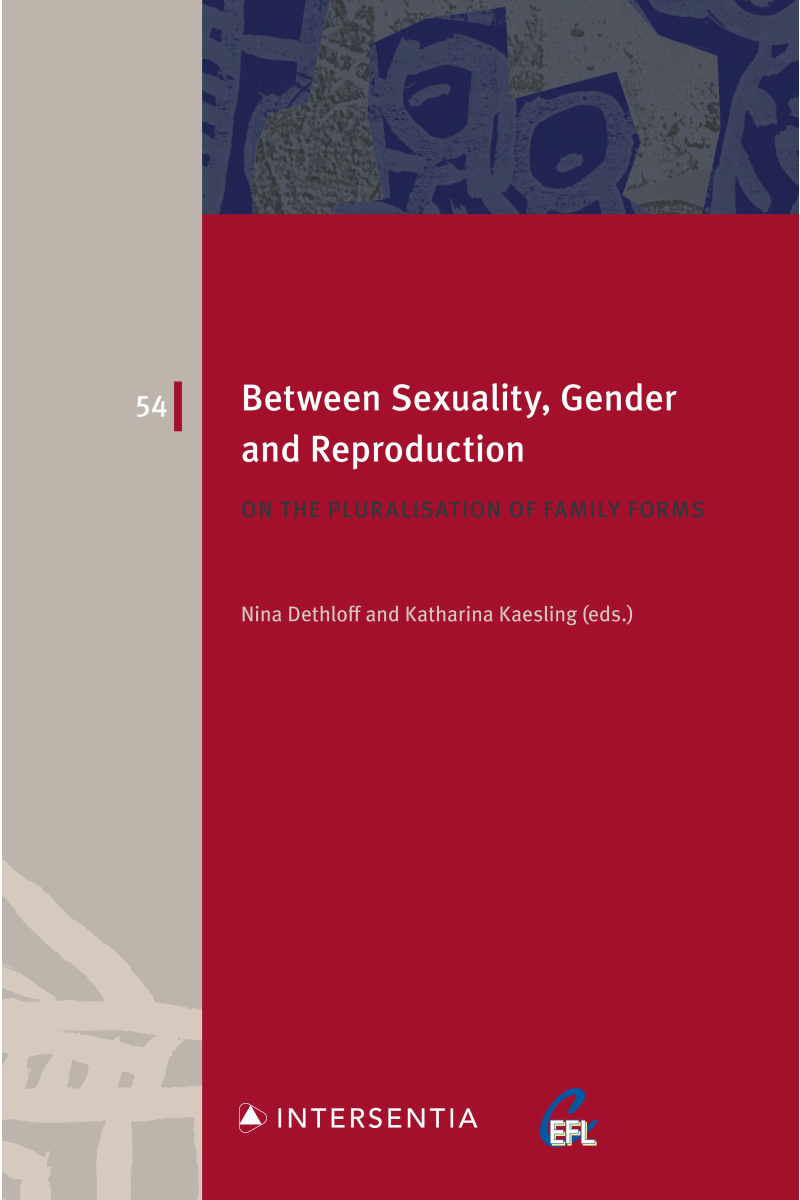 maestro
mastercard
visa
maestro
mastercard
visa

Between Sexuality, Gender and Reproduction
On the Pluralisation of Family Forms

This book is available as an Open Access publication in e-book format. To access the e-book, click the 'E-book' button on the right hand side of the page.
This edited volume examines the diversity and pluralisation of family concepts that are subject to change as a result of the no longer self-evident interrelationships between sexuality, gender and reproduction. The focus is on the manifold challenges for jurisprudence and legislation brought about by today’s pluralisation of family forms and on divisive tensions that accompany the social and normative transformations. Same-sex partnerships, LGBTQI+ families and self-determination regarding one’s gender are increasingly recognised and treated equally. Assisted reproductive technology leads to a possible severance of biological, genetic and social family links. Against this background, how should legal concepts of partnership, family and parenthood be constructed in the future? How do the highest courts and human rights help shape new legal approaches? What are the common trends of co-existing legal systems? Where does the international community of states risk breaking apart? To answer these questions, this book brings together international expertise, namely from Australia, Austria, Germany, Poland, Portugal, South Africa and the USA.
The book begins by discussing the dependence of the legal framework governing sexuality, gender and reproduction on the changing foundations of the family organisation and economy in Western countries. Having identified common trends in European legal orders, the question arises whether there is a common core of the diverse legal cultures. A key example of the plurality of family forms leading to a plurality of legal regulations within one legal system is South Africa, which is taken into focus. The overarching significance of religion and churches for the concept of family in co-existing legal systems must also be taken into account. Furthermore, with regard to the highest courts, particularly the European Court of Human Rights (ECtHR) and the Court of Justice of the European Union (CJEU), important landmarks can be identified that shape past and present legal developments in relation to sexuality, gender and reproduction. However, these developments are also accompanied by threateningly divisive tensions. Moreover, they raise the question of the role of genetic links concerning parenthood, which are approached with regard to legal adjustments in Portugal and the jurisprudence of the ECtHR. Social recognition of diverse family forms is not only a matter of legal regulation, but also of representation of family images in the social realm, namely in art and (new) media, which in turn are also the object of increasing legislation.
Between Sexuality, Gender and Reproduction will be of interest to researchers, lecturers and students. Through this book, they are invited to find inspiration and ideas for the ongoing academic discussion.
Marta Bucholc (University of Warsaw, Poland), June Carbone (University of Minnesota, USA), Nina Dethloff (University of Bonn, Germany), Judith Hahn (University of Bonn, Germany), Katharina Kaesling (University of Dresden, Germany), Felix Leven (University of Bonn, Germany), Alice Margaria (Max Planck Institute for Social Anthropology Halle (Saale), Germany), Dieter Martiny (European University Viadrina Frankfurt (Oder), Germany), Johannes Masing (University of Freiburg, Germany), Angelika Nußberger (University of Cologne, Germany), Christa Rautenbach (North-West University, South Africa), Paula Távora Vítor (University of Coimbra, Portugal), Sascha Trültzsch-Wijnen (University of Salzburg, Austria), Cathérine Van de Graaf (University of Cologne, Germany) and Paul Venzo (Deakin University, Australia).
Prof. Dr. Nina Dethloff, LL.M., is Professor of Civil Law, Private International Law, Comparative Law and European Private Law at the University of Bonn and Director of the Institute for German, European and International Family Law.
Prof. Dr. Katharina Kaesling, LL.M., is Tenure Track Junior Professor of Civil Law, Intellectual Property Law and Legal Issues of Artificial Intelligence at the University of Dresden (TU).
| Type of product | Book |
|---|---|
| Format | Paperback |
| EAN / ISSN | 9781839703126 / 9781839703515 |
| Series name | European Family Law |
| Weight | 500 g |
| Status | Available |
| Number of pages | xii + 270 p. |
| Access to exercice | No |
| Publisher | Intersentia |
| Language | English |
| Publication Date | Jan 31, 2023 |
| Available on Strada Belgique | No |
| Available on Strada Europe | No |
| Available on Strada Luxembourg | No |
Downloads
- Table of contents and preliminary pages
Nina Dethloff, Katharina Kaesling - From Marriage to Family: Plurality of Family Forms from a Comparative Perspective
- PART I. COEXISTENCE OF LEGAL SYSTEMS
- Uncoupling and the New Social Compact: A Paradigm Shift in Western Family Organisation
- Diverse Legal Cultures, Common Core? The CEFL Principles of European Family Law
- Families and Legal Pluralism in South Africa: Celebrating Diversity but at what Cost?
- The Catholic Concept of ‘Family’ in the Secular State
- PART II. CONCEPTIONS OF FAMILY AND THE INTERNATIONAL COMMUNITY OF STATES
- Pluralisation of Family Forms in the Jurisprudence of the European Court of Human Rights
- The Shaping of the Law by the Highest Courts in the Realm of Families
- Conditions for LGBTIQ+ Families in Poland: Breaking Away from the Community of States?
- PART III. NATURE AND NURTURE AND THE IN-BETWEEN: THE ROLE OF GENETIC LINKS FOR THE RECOGNITION OF FAMILIES
- The Determination of Parenthood in the Portuguese Legal System and the Law of Medically Assisted Procreation: Rolling the Dice Again
- Genetics and the Construction of Parenthood: The ECtHR Jurisprudence on Transnational Surrogacy
- PART IV. DIVERSITY OF FAMILIES IN MEDIA AND ART
- Families, Images, Media: A Brief History of Family Images from Paint to Television to Social Media
- Rainbow Families on Social Media: Diversity and Plurality as Matters of Platform Regulation
- Rainbow Connections: Representations of LGBTI+ Families in Children’s Picture Books